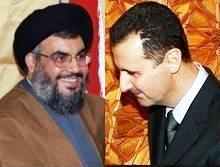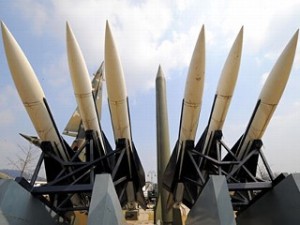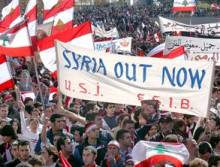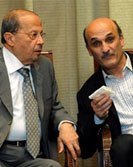
*By : Michael Young
When Syria’s President Bashar Assad withdrew his army from Lebanon in 2005, there was a naive belief he had accepted the new situation and would be satisfied merely with reasserting Syrian political influence in Beirut. In fact, his ambition always was, and remains, to return Syria militarily to Lebanon.
In recent weeks, the US has accused Syria of transferring advanced weaponry to Hizbullah. Kuwait’s Al-Rai al-Aam newspaper and Israeli media have suggested this may include Scud-D missiles. There have also been reports, including statements by Israeli officials, that Syria has sent the party anti-aircraft missiles, including possibly the advanced SA-24 Igla. Damascus has denied this, but in 2007, when Hizbullah’s leader, Hassan Nasrallah, said the party had acquired a new “surprise” weapon against Israel, many believed that he meant an advanced anti-aircraft capability.
 It is hard to accept as credible Syria’s denials that it has sent improved weapons to Hizbullah when Assad has repeatedly stated that he would not allow the “resistance” to be defeated. Senator John Kerry, a prominent defender of American engagement of Damascus, is said to have raised concerns about the weapons when he last visited with the Syrian president. Why is Damascus upping the ante in Lebanon today?
It is hard to accept as credible Syria’s denials that it has sent improved weapons to Hizbullah when Assad has repeatedly stated that he would not allow the “resistance” to be defeated. Senator John Kerry, a prominent defender of American engagement of Damascus, is said to have raised concerns about the weapons when he last visited with the Syrian president. Why is Damascus upping the ante in Lebanon today?
Let’s go back to April 2007 to understand Assad’s frame of mind. At the time, the Syrian president received UN chief Ban Ki-moon, in Damascus. The two men discussed several issues, then Assad made this comment: “In Lebanon, divisions and confessionalism have been deeply anchored for more than 300 years. Lebanese society is very fragile. [The country’s] most peaceful years were when Syrian forces were present. From 1976 to 2005 Lebanon was stable, whereas now there is great instability.”
 Assad was right; there was great instability. And that was largely thanks to the efforts of Syria and its Lebanese allies, who between 2005 and 2009 undermined all efforts by the parliamentary majority to consolidate a sovereign Lebanese state. But Assad’s assessment was more than a detached observation. It was an essential part of his worldview, passed on by his father, Hafez, that Syria must rule over Lebanon to punch above its weight in the Middle East.
Assad was right; there was great instability. And that was largely thanks to the efforts of Syria and its Lebanese allies, who between 2005 and 2009 undermined all efforts by the parliamentary majority to consolidate a sovereign Lebanese state. But Assad’s assessment was more than a detached observation. It was an essential part of his worldview, passed on by his father, Hafez, that Syria must rule over Lebanon to punch above its weight in the Middle East.
And without a military presence in Lebanon, Bashar Assad knows, Syrian hegemony will always be incomplete. Damascus has no real “soft power” in Beirut. It’s allies, other than Hizbullah, which is ultimately more Iranian than Syrian, are weak. Only an army in place can intimidate the two communities at the heart of the Syrian regime’s preoccupations since the mid-1970s, when Hafez Assad dispatched his brigades to Lebanon: the Sunnis and the Maronites.
The Maronites have lost much since then, but continue to be a significant thorn in the Syrians’ side. They have long led opposition to Syria, and even if Michel Aoun has reconciled with Damascus, his efforts have convinced few Christians. The Syrians aren’t blind. The Lebanese Forces have proven more dynamic than the Aounists lately, even if there are Christians who will never embrace Samir Geagea. But the future bodes ill for the Aounists. The movement is divided over Aoun’s succession and is likely to fragment once he expires.
 The Syrians are watching Geagea very carefully, and have made it clear that their relationship with Prime Minister Saad Hariri is partly a function of Hariri’s ties with Geagea. Syria wants to break the Hariri-Geagea bond, and through it a Sunni-Maronite barrier to a Syrian military return. But Assad also must sense that unless his army is in Lebanon, little will keep the Sunnis and Maronites in line.
The Syrians are watching Geagea very carefully, and have made it clear that their relationship with Prime Minister Saad Hariri is partly a function of Hariri’s ties with Geagea. Syria wants to break the Hariri-Geagea bond, and through it a Sunni-Maronite barrier to a Syrian military return. But Assad also must sense that unless his army is in Lebanon, little will keep the Sunnis and Maronites in line.
More disturbing to Syria’s regime is Lebanese Sunni discontent. Strangely enough, Geagea speaks to that more effectively than Hariri, principally because the prime minister is constrained by his position and by his Saudi sponsors. The Sunnis are the main hindrance to absolute Syrian control over Lebanon, a community as powerful as the Shiites, a reminder to the minority-dominated Assad regime of its own vulnerabilities, and, under Hariri, a personification of the divorce from Syria after the assassination of Rafik Hariri and the May 2008 takeover of western Beirut by Hizbullah and Syria’s allies.
In this context, what role are the Syrian arms to Hizbullah playing? To return to Lebanon militarily, Syria needs several prerequisites: An Arab consensus in favor; an Israeli green light; approval by Western governments, above all the United States; and a Lebanese political class that is split over Syria. Assad is working hard on the last of these conditions, and would probably face anemic Arab opposition to a military return to Lebanon if the situation allowed it.
That leaves the US and Israel. In 1976, both signed off on a Syrian move into Lebanon to bring the PLO to heel. If Bashar Assad were able to depict Hizbullah as a new PLO, a threat to regional stability, he might successfully replicate his father’s actions over three decades ago. But for that to work, the Syrian leader needs a new war to show up the party as a problem that only Syria can resolve. So you arm Hizbullah with weapons that are game changers in a conflict against Israel. However, Hizbullah need not worry. Assad would never stifle the party, since he needs to keep it alive as a menace to justify Syria’s presence in Lebanon. This would return the country to the pre-2005 balance that Syria and Hizbullah mutually benefited from.
That’s Assad’s objective, but can he implement it? Much will depend on America. Unless Assad sees that a new Lebanon war might also harm him, he will continue to plot his Lebanese military comeback.
* Michael Young is opinion editor of THE DAILY STAR. His “The Ghosts of Martyrs Square: An Eyewitness Account of Lebanon’s Life Struggle” (Simon & Schuster) has just been released.

Leave a Reply
You must be logged in to post a comment.